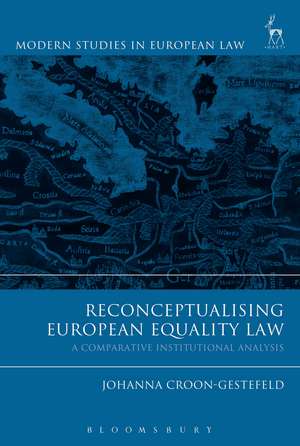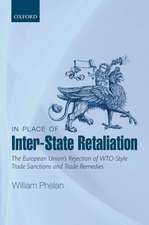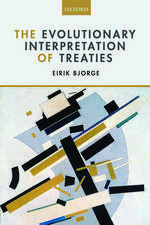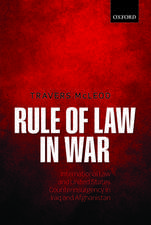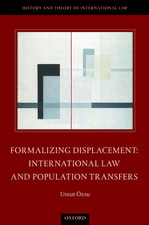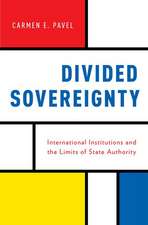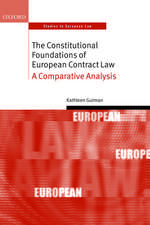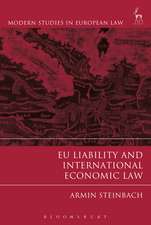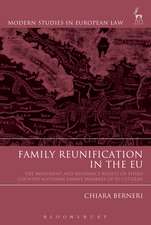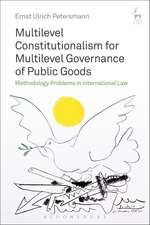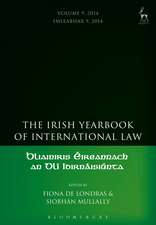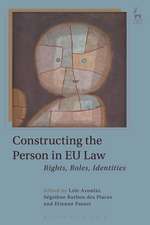Reconceptualising European Equality Law: A Comparative Institutional Analysis: Modern Studies in European Law
Autor Johanna Croon-Gestefelden Limba Engleză Paperback – 26 iun 2019
| Toate formatele și edițiile | Preț | Express |
|---|---|---|
| Paperback (1) | 238.49 lei 6-8 săpt. | |
| Bloomsbury Publishing – 26 iun 2019 | 238.49 lei 6-8 săpt. | |
| Hardback (1) | 513.60 lei 6-8 săpt. | |
| Bloomsbury Publishing – 22 feb 2017 | 513.60 lei 6-8 săpt. |
Din seria Modern Studies in European Law
- 19%
 Preț: 296.91 lei
Preț: 296.91 lei - 24%
 Preț: 440.21 lei
Preț: 440.21 lei - 31%
 Preț: 594.77 lei
Preț: 594.77 lei - 30%
 Preț: 570.22 lei
Preț: 570.22 lei -
 Preț: 181.55 lei
Preț: 181.55 lei - 30%
 Preț: 790.77 lei
Preț: 790.77 lei - 30%
 Preț: 507.97 lei
Preț: 507.97 lei - 30%
 Preț: 541.93 lei
Preț: 541.93 lei - 34%
 Preț: 509.45 lei
Preț: 509.45 lei - 30%
 Preț: 511.64 lei
Preț: 511.64 lei - 30%
 Preț: 721.14 lei
Preț: 721.14 lei - 30%
 Preț: 571.34 lei
Preț: 571.34 lei - 27%
 Preț: 475.10 lei
Preț: 475.10 lei - 30%
 Preț: 572.80 lei
Preț: 572.80 lei - 23%
 Preț: 418.50 lei
Preț: 418.50 lei - 11%
 Preț: 375.73 lei
Preț: 375.73 lei - 30%
 Preț: 575.75 lei
Preț: 575.75 lei - 19%
 Preț: 317.21 lei
Preț: 317.21 lei - 19%
 Preț: 296.72 lei
Preț: 296.72 lei - 18%
 Preț: 320.53 lei
Preț: 320.53 lei - 18%
 Preț: 321.66 lei
Preț: 321.66 lei - 30%
 Preț: 600.57 lei
Preț: 600.57 lei - 30%
 Preț: 512.22 lei
Preț: 512.22 lei - 30%
 Preț: 571.34 lei
Preț: 571.34 lei -
 Preț: 464.01 lei
Preț: 464.01 lei -
 Preț: 239.78 lei
Preț: 239.78 lei - 30%
 Preț: 538.03 lei
Preț: 538.03 lei - 30%
 Preț: 539.57 lei
Preț: 539.57 lei - 30%
 Preț: 595.65 lei
Preț: 595.65 lei - 30%
 Preț: 571.66 lei
Preț: 571.66 lei - 29%
 Preț: 587.97 lei
Preț: 587.97 lei - 30%
 Preț: 774.62 lei
Preț: 774.62 lei - 30%
 Preț: 570.43 lei
Preț: 570.43 lei - 30%
 Preț: 574.10 lei
Preț: 574.10 lei - 28%
 Preț: 495.80 lei
Preț: 495.80 lei - 30%
 Preț: 575.33 lei
Preț: 575.33 lei - 30%
 Preț: 571.24 lei
Preț: 571.24 lei - 30%
 Preț: 510.34 lei
Preț: 510.34 lei - 20%
 Preț: 219.19 lei
Preț: 219.19 lei - 30%
 Preț: 601.69 lei
Preț: 601.69 lei - 30%
 Preț: 513.60 lei
Preț: 513.60 lei - 18%
 Preț: 305.72 lei
Preț: 305.72 lei - 30%
 Preț: 972.83 lei
Preț: 972.83 lei - 30%
 Preț: 515.24 lei
Preț: 515.24 lei - 30%
 Preț: 539.99 lei
Preț: 539.99 lei - 30%
 Preț: 570.83 lei
Preț: 570.83 lei - 30%
 Preț: 571.82 lei
Preț: 571.82 lei - 29%
 Preț: 554.35 lei
Preț: 554.35 lei - 30%
 Preț: 572.06 lei
Preț: 572.06 lei
Preț: 238.49 lei
Preț vechi: 306.13 lei
-22% Nou
Puncte Express: 358
Preț estimativ în valută:
45.64€ • 47.99$ • 37.71£
45.64€ • 47.99$ • 37.71£
Carte tipărită la comandă
Livrare economică 17 aprilie-01 mai
Preluare comenzi: 021 569.72.76
Specificații
ISBN-13: 9781509930135
ISBN-10: 1509930132
Pagini: 282
Dimensiuni: 156 x 234 mm
Greutate: 0.4 kg
Editura: Bloomsbury Publishing
Colecția Hart Publishing
Seria Modern Studies in European Law
Locul publicării:London, United Kingdom
ISBN-10: 1509930132
Pagini: 282
Dimensiuni: 156 x 234 mm
Greutate: 0.4 kg
Editura: Bloomsbury Publishing
Colecția Hart Publishing
Seria Modern Studies in European Law
Locul publicării:London, United Kingdom
Caracteristici
An interesting read for academics and practitioners of EU law, labour law and human rights
Notă biografică
Johanna Croon-Gestefeld is Postdoctoral Fellow at Bucerius Law School.
Cuprins
1. Introduction I. Equality: A Fundamental Principle Based on not so Stable Fundaments II. The Need for Reconceptualising Equality Law or the Rationalist Human Rights Paradigm III. EU Law as the Laboratory of Constitutional Theory IV. The Institutional Choice Approach to EU Equality Law 2. The Notion of Equality I. Why Equality? II. What Kind of Equality? III. The Relationship of Equality and Non-discrimination 3. Equality Testing: Different Kinds of Scrutiny I. Three Standards of Scrutiny II. Traditional Interpretive Explanation III. Changing Perspectives: A Comparative Institutional Explanation IV. Conclusion 4. Differential Treatment of EU Citizens I. Non-discrimination on Grounds of Nationality: A Leitmotiv of the TFEU II. Article 18(1) TFEU: A Relative Right to Equal Treatment III. Challenges to the Equal Treatment of EU CitizensIV. Equal Treatment of EU Citizens: An Institutional Choice Reconstruction V. Conclusion 5. Reverse Discrimination I. Reverse Discrimination: Its Definition, Egalitarian Tune and Relevance II. The European Court of Justice's Handling of Reverse Discrimination III. The Fundamental Boundaries Concern-or Institutional Choice in the Supranational Context 6. Affirmative Action for Women I. The European Union Jurisprudence II. The American Experience III. Translating the American Experience to the European Debate IV. Comparative Institutional Analysis of Affirmative Action 7. Conclusion I. Breaking down the Divides II. The Four Conceivable Relations between Equality Review and Institutional Choice III. More Coherence through Doctrinal Adaptation IV. Summary of the Thesis in Eight Points
Recenzii
Reconceptualising EU equality law is a great challenge. Johanna Croon-Gestefeld approaches it from an angle that, in practice, is often veiled and not fully understood by the public. By trying to make sense of the CJEU's equality adjudication and analysing it from a comparative-institutional point of view, she contributes to a better understanding of EU equality law. One of the strengths of this book is that she provides concrete tools and techniques for judges to carry out such a comparative institutional analysis (see, in particular, Chapter 7). This book can therefore be warmly recommended as a very worthwhile read.
Croon-Gestefeld's reconceptualization of EU equality law revisits the subject matter in a provoking and fascinating way, trying to lift the mystery surrounding the ECJ's deliberations, and thus contributing to a better understanding and awareness of the complexity characterizing that set of rules and its enforcement. Practitioners and researchers interested in EU equality law will therefore find the book particularly interesting and useful.
Croon-Gestefeld's reconceptualization of EU equality law revisits the subject matter in a provoking and fascinating way, trying to lift the mystery surrounding the ECJ's deliberations, and thus contributing to a better understanding and awareness of the complexity characterizing that set of rules and its enforcement. Practitioners and researchers interested in EU equality law will therefore find the book particularly interesting and useful.
